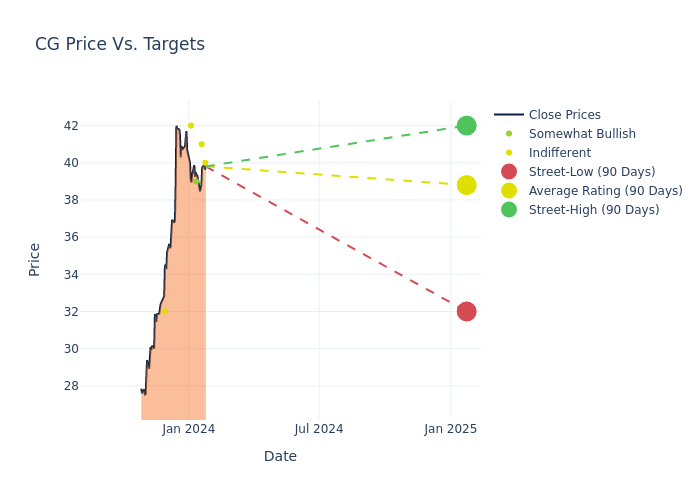In the last three months, 6 analysts have published ratings on Carlyle Group CG, offering a diverse range of perspectives from bullish to bearish.
Summarizing their recent assessments, the table below illustrates the evolving sentiments in the past 30 days and compares them to the preceding months.
| Bullish | Somewhat Bullish | Indifferent | Somewhat Bearish | Bearish | |
|---|---|---|---|---|---|
| Total Ratings | 0 | 2 | 4 | 0 | 0 |
| Last 30D | 0 | 0 | 1 | 0 | 0 |
| 1M Ago | 0 | 1 | 2 | 0 | 0 |
| 2M Ago | 0 | 0 | 1 | 0 | 0 |
| 3M Ago | 0 | 1 | 0 | 0 | 0 |
In the assessment of 12-month price targets, analysts unveil insights for Carlyle Group, presenting an average target of $38.67, a high estimate of $42.00, and a low estimate of $32.00. Witnessing a positive shift, the current average has risen by 5.22% from the previous average price target of $36.75.

Analyzing Analyst Ratings: A Detailed Breakdown
An in-depth analysis of recent analyst actions unveils how financial experts perceive Carlyle Group. The following summary outlines key analysts, their recent evaluations, and adjustments to ratings and price targets.
| Analyst | Analyst Firm | Action Taken | Rating | Current Price Target | Prior Price Target |
|---|---|---|---|---|---|
| Michael Cyprys | Morgan Stanley | Raises | Equal-Weight | $40.00 | $34.00 |
| Christopher Allen | Citigroup | Raises | Neutral | $41.00 | $40.00 |
| Kenneth Worthington | JP Morgan | Raises | Overweight | $39.00 | $38.00 |
| Bill Kirk | TD Cowen | Announces | Market Perform | $42.00 | - |
| Glenn Schorr | Evercore ISI Group | Announces | In-Line | $32.00 | - |
| Kenneth Worthington | JP Morgan | Raises | Overweight | $38.00 | $35.00 |
Key Insights:
- Action Taken: Analysts frequently update their recommendations based on evolving market conditions and company performance. Whether they 'Maintain', 'Raise' or 'Lower' their stance, it reflects their reaction to recent developments related to Carlyle Group. This information provides a snapshot of how analysts perceive the current state of the company.
- Rating: Analysts assign qualitative assessments to stocks, ranging from 'Outperform' to 'Underperform'. These ratings convey the analysts' expectations for the relative performance of Carlyle Group compared to the broader market.
- Price Targets: Analysts gauge the dynamics of price targets, providing estimates for the future value of Carlyle Group's stock. This comparison reveals trends in analysts' expectations over time.
Understanding these analyst evaluations alongside key financial indicators can offer valuable insights into Carlyle Group's market standing. Stay informed and make well-considered decisions with our Ratings Table.
Stay up to date on Carlyle Group analyst ratings.
Get to Know Carlyle Group Better
The Carlyle Group is one of the world's largest alternative-asset managers, with $382.3 billion in total assets under management, including $273.0 billion in fee-earning AUM, at the end of September 2023. The company has three core business segments: private equity, which includes private equity, real estate, infrastructure, and natural resources funds (accounting for 40% of fee-earning AUM and 64% of base management fees during 2023), global credit (46% and 25%) and investment solutions (14% and 11%). The firm primarily serves institutional investors and high-net-worth individuals. Carlyle operates through 29 offices across five continents, serving more than 2,900 active carry fund investors from 88 countries.
Understanding the Numbers: Carlyle Group's Finances
Market Capitalization Analysis: Reflecting a smaller scale, the company's market capitalization is positioned below industry averages. This could be attributed to factors such as growth expectations or operational capacity.
Decline in Revenue: Over the 3 months period, Carlyle Group faced challenges, resulting in a decline of approximately -22.91% in revenue growth as of 30 September, 2023. This signifies a reduction in the company's top-line earnings. When compared to others in the Financials sector, the company faces challenges, achieving a growth rate lower than the average among peers.
Net Margin: Carlyle Group's net margin lags behind industry averages, suggesting challenges in maintaining strong profitability. With a net margin of 12.96%, the company may face hurdles in effective cost management.
Return on Equity (ROE): Carlyle Group's ROE falls below industry averages, indicating challenges in efficiently using equity capital. With an ROE of 1.37%, the company may face hurdles in generating optimal returns for shareholders.
Return on Assets (ROA): Carlyle Group's ROA is below industry averages, indicating potential challenges in efficiently utilizing assets. With an ROA of 0.38%, the company may face hurdles in achieving optimal financial returns.
Debt Management: Carlyle Group's debt-to-equity ratio is notably higher than the industry average. With a ratio of 1.55, the company relies more heavily on borrowed funds, indicating a higher level of financial risk.
Understanding the Relevance of Analyst Ratings
Experts in banking and financial systems, analysts specialize in reporting for specific stocks or defined sectors. Their comprehensive research involves attending company conference calls and meetings, analyzing financial statements, and engaging with insiders to generate what are known as analyst ratings for stocks. Typically, analysts assess and rate each stock once per quarter.
Some analysts publish their predictions for metrics such as growth estimates, earnings, and revenue to provide additional guidance with their ratings. When using analyst ratings, it is important to keep in mind that stock and sector analysts are also human and are only offering their opinions to investors.
This article was generated by Benzinga's automated content engine and reviewed by an editor.
© 2025 Benzinga.com. Benzinga does not provide investment advice. All rights reserved.
date | ticker | name | Price Target | Upside/Downside | Recommendation | Firm |
|---|
Trade confidently with insights and alerts from analyst ratings, free reports and breaking news that affects the stocks you care about.